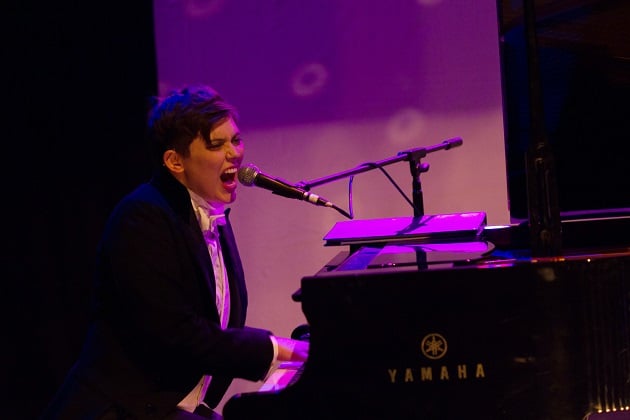In this blog, musician, writer, activist and author of "Trans Like Me" CN Lester discusses how you can better support your trans colleagues in the arts.

Do use the skills you already have
The most common fear I hear from potential allies to trans people in the arts is the worry that they’re going to get it wrong. Luckily, you don’t need any special skills to support trans colleagues – we’re looking for the same basic level of respect, empathy, and tact that you would (hopefully) show to any fellow musician.
Don’t add awkward extras
We don’t need you to explain us to other people, or tie yourself into knots with convoluted language and explanations: ‘she self-identifies as a they’? No thank you. Please just use the names, words, and pronouns that we use, and don’t make excuses as to why that’s somehow too hard.
Do question what you know
Where does your knowledge of trans people come from? Is it based on trans people ourselves – our communities, research, literature, artistic expressions? Or has it come from a frequently hostile and misinformed mass media, whether that’s TV, film, radio, or newsprint? Is it based on fiction or fact?
Don’t treat trans colleagues as your own personal Google
It’s great to want to learn more about trans people, but it’s exhausting to be a trans musician fielding questions in the rehearsal room. When I come to work I want to work.
It’s bad enough when the questions are relatively benign (“when did you know?”), but when demands for information become deeply personal and/or combative (“what surgeries have you had?”/”what are you really?”) then my ability to make music in an equal environment, and to trust my colleagues, is damaged.
Do examine your first responses
As a genderqueer trans person, I’m used to being called confusing. I can accept that some people will be confused when they first meet someone who isn’t a man or a woman; what I reject is the idea that their confusion is my fault.
Nearly all of us were brought up in a world of strict and unbreakable rules around gender; accepting that those rules aren’t so strict after all can be a challenge. What’s vital for me is that we each accept the challenge ourselves, rather than pushing that confusion, and potentially even anger and disgust, onto trans people.
Don’t relegate trans people to ‘trans issues’
Not ‘trans ideologies’, ‘trans agendas’ or ‘the trans debate’ – we are trans people. We exist in every part of society, in every kind of community, and we are not here, as your colleagues, to argue for our right to exist. Just as our diversity cannot be boxed in by the idea of a ‘trans agenda’, so too our musical creativity cannot be relegated to ‘trans issues.’
Maybe I’ll want to create a project about trans history – and maybe I’ll want to write a new collection of nocturnes. Maybe both. When we’re only included in line-ups when producers want to trade on the fact that we’re trans and they’re progressive, then there’s a problem.
Do use the power you have to help others
If you hear transphobia, say something. If we’re being misgendered behind our backs, correct it. And if you’re part of an organisation that has never engaged with trans artists, and those working in the arts, ask why.
Don’t use your position to talk over us
People who aren’t trans can be very keen to engage with projects based on ‘trans issues’ – with no trans people involved. The world is full of ‘trans’ shows, live or filmed, where cis people are trying to talk for us; in nearly every instance they get it wrong.
We don’t need another musical, opera, or ballet where cis people pretend to be trans people transitioning, coming out, being rejected and attacked, and either bravely struggling on or nobly dying. But we do need our cis colleagues to support the projects that we’re making, whatever they’re about.
Do be trans positive from a proactive, not reactive place
You don’t have to wait until there’s an obvious problem before you do the right thing. If you work for an arts organisation, you can make sure that your organisation is a safe and supportive place for trans colleagues, and promote it as such.
You can support trans musicians before there’s a backlash against us. Rather than just condemning bigotry against us, please engage with and celebrate our work, and our successes.
Don’t dismiss transphobia because ‘the arts aren’t like that’
I promise you, the arts are like that. I’ve been out since I was a teenager, and I have experienced transphobia in music for the entirety of my professional life, including during my training.
It’s very easy for people who aren’t targeted by transphobia to imagine that it doesn’t exist, and to think that the arts are somehow progressive by default. But we can’t solve problems of prejudice and exclusion if the majority of people don’t want to admit that there’s a problem at all. The first step to make it right is to recognise that there’s a job to do.
This article was published as part of the MU’s participation in Transgender Awareness Week, which runs in the UK each year, 13 – 19 November.
LGBT+ Members Network
Joining a network that you identify with ensures that our work represents you. Play a vital role in shaping our services, policies and campaigns.
LGBT+ members can sign up through the communication preferences page to receive occasional updates and be notified of opportunities to get involved.
Join a members network